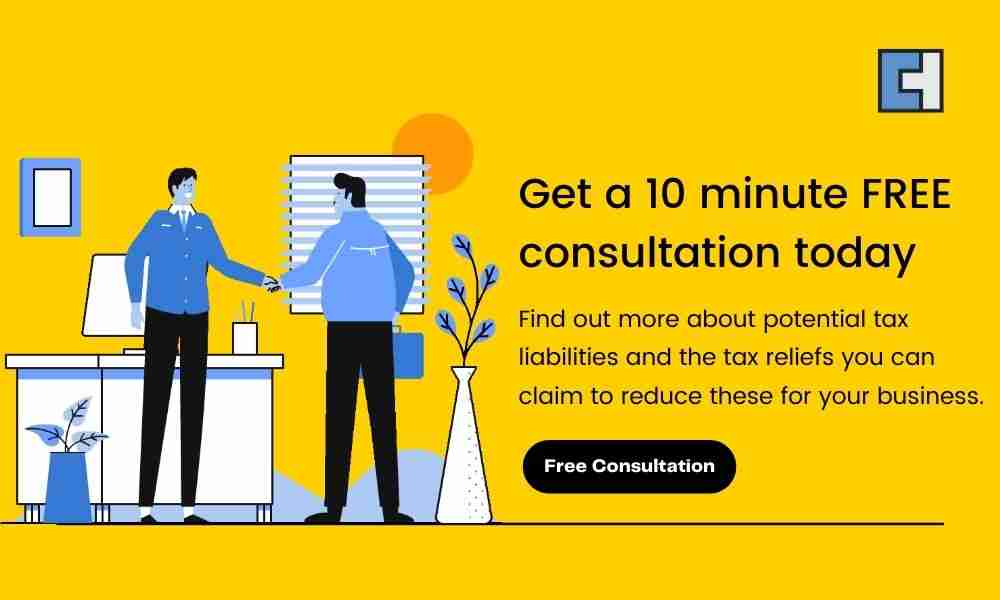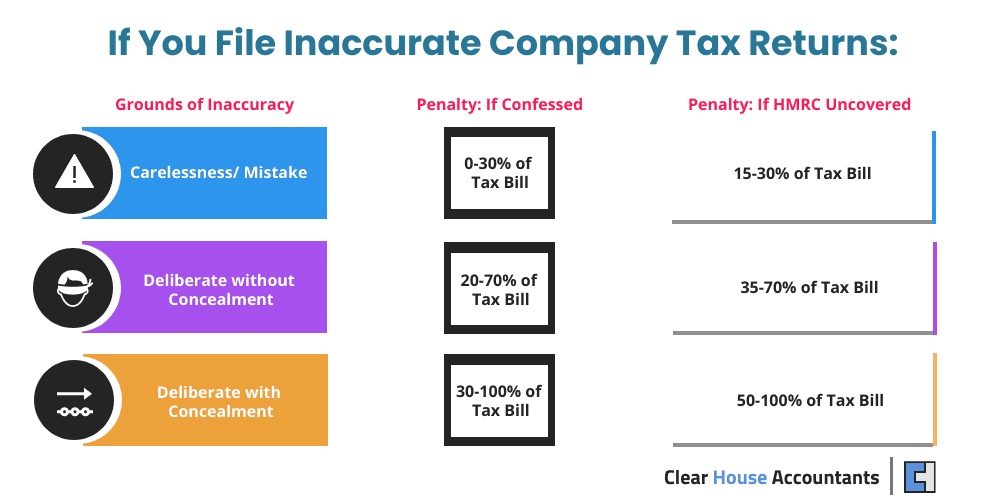Corporation tax (CT) is paid by limited companies, foreign companies with local branches and other profit-making unincorporated entities on trading profits, investments and gains from the sale of assets. The corporation tax bill is charged at 19%, but as per the new budget announced on March 3, 2021, the chancellor has pronounced a rise in the headline rate to 25% from April 2023.
The rate for companies with profits below £50,000 will be 19%, and it will increase proportionately with the profits till the amount of £250,000, at and above which the rate will be 25%. A company that is making a profit of £250,000 will pay £47,500 at 19% tax deductible in the year 2020-21.
This is material already, but in the year 2023-24, tax for the same amount of profit will further increase to £57,500. The magnitude of outflows associated with corporation tax bills makes it a material issue for small business owners to pay more attention to. Let’s have a look at the government tax reliefs and tips compiled by our expert accountants that can help you reduce corporation tax liability while remaining tax efficient using simple practices.

Patent Box Tax Relief: How to Claim?
A patent box is a corporation tax relief that motivates companies to house their valuable intellectual property within the UK and use it for commercial purposes. Companies that earn profit through patented inventions are then subjected to a lower CT rate, i.e. 10%. Companies must elect a patent box if they wish to reduce corporation tax bills and curtail their CT charge. However, certain conditions must be fulfilled to do so:
- The company should be liable to pay the corporation tax bill
- Its profits should result from the use of patented assets
- The company owns or has exclusively licensed-in patents, and
- The company has undertaken qualifying development on the patents
Once a patent is licensed, to get elected in the patent box tax relief, the company must show that it has undertaken qualifying development for the patent, i.e. it has made a significant contribution to either the creation or development of the patented product or a component product of the patented invention.

Research and Development Tax Relief
Research and development (R&D) is the corporation tax relief meant for companies that participate in advanced research and development in science and technology. Companies that wish to advance in any sector based on their research and development in science and technology can claim this tax relief. The projects with no or less success can also be used to qualify for this relief.
However, for a project to claim this tax relief successfully, it must meet the definition of R&D, i.e. you need to establish how the project:
- looked for an advance in science and technology
- had to overcome uncertainty
- tried to overcome this uncertainty
- could not be easily worked out by a professional in the field
The R&D tax relief depends on the company’s size, i.e. it varies for SMEs and large companies.
Claim Creative Industry Tax Relief
The companies that qualify for creative industry relief get an increase in their allowable business expenses, i.e. they can claim relief exceeding the usually permissible capital allowance limit. A company can claim relief if it is:
- Liable to corporation tax
- Directly involved in the production of films, high-end television, children’s television, animation television, video games, theatrical shows, orchestral concerts, museum or gallery exhibitions
- Involved in decision making
- directly negotiates, contracts and pays for rights, goods and services
Furthermore, to qualify for aid under creative industry tax relief, all the films, programmes and video games must be certified as British. They must pass the cultural certificate to get licensed by the British Film Institute.
Video: 15 Legal Ways to Reduce Corporate Tax
Use Annual Investment Allowance
Annual investment allowance allows companies to deduct their investment in plant and machinery up to a certain threshold from profit before tax, thus reducing the corporation tax. The annual investment allowance is currently set at £1 million until 31st December 2021 and will subsequently reduce to £200,000.
For example, if a firm has reported profits of £800,000 and its investment during the year in plant and machinery stands at £400,000, the entire investment can be deducted from profit, i.e. the company will pay tax on £400,000 of its profits.
The items for which the resources have been spent should meet the requirements to be categorised as plant and equipment, i.e.
- items intended for business use, such as vehicles
- costs of demolishingthe plant and machinery
- ‘integral features,’ i.e. parts integral to a building
- some fixtures such as fitted kitchens or bathroom suites
- alterations to a building to install other plant and machinery (excluding repairs)
Claim Allowable Expenses Timely
This is the simplest way to limit your corporation tax, i.e. recording every business expense and then using those to minimise the profit on which the corporation tax liability arises. According to HMRC, for business expenses to be tax-deductible, they should be wholly and exclusively for the business. Most Limited companies are nevertheless bound to keep records for at least six years.
Apart from the criteria of ‘wholly and exclusively for business,’ the reasonableness and fairness of business expenses might also be considered by HMRC before approval. Certain business expenses can be claimed for sure, such as expenses like salaries, cost of equipment, assets and the cost of asset disposal, employee expenses, legal and professional fees, professional license payments, entertainment expenses, utility bills, etc.
Pay yourself a salary
The separate entity concept should be kept in mind as it defines that a starting limited company is a separate legal entity and that its transactions are discrete from the transactions of its owners. Therefore, paying yourself is a way to get to the profits of a limited company. This will be treated as an allowable expense for the company, thus reducing the corporation tax.
Nevertheless, caution should be exercised while defining the nature of outflow and the mix of salary and dividend, therefore it is preferable to consult your accountant. If profits are drawn out in the form of both salary and dividends, this has to be announced; otherwise, HMRC will treat the whole outflow as a salary, raising the individual’s liability by charging income tax and NIC on it.
Early Payment of Due Tax
Paying corporation tax early not only safeguards businesses from late submission penalties and extra charges but, conversely, gives rise to interest income. HMRC pays interest on early payment of corporation tax, i.e. ‘credit interest’. The interest is paid at 0.5% for the period covering the date of tax prepayment till the deadline. The earliest you can receive interest would be six months and 13 days after the start of the business’s accounting period.
Let’s suppose your accounting period starts on 1st February 2020 and ends on 31 January 2021; your corporation tax payment window will be from 13 August 2020 (6 months and 13 days from the start of the business’s accounting period) to 1 November 2021 (HMRC’s deadline). You can earn interest for the period between 13 August to 1 November 2021.
Note: The interest earned through early payment of corporation tax is an income for the business and should be treated accordingly for tax purposes.

Claim Business Mileage
You can claim travel expenses as business expenses if the travel is solely done for the business and your presence at the destination is warranted for business purposes. However, this is not the case for the mileage spent on daily commuting to your permanent workplace.
If you use a car or van to commute, you can claim 45p per mile for the first 10,000 miles and then 25p for every mile above it. If you are a motorcyclist, you can claim 24p per mile; for cyclists, the rate is 20p per mile.
Apart from business mileage, other costs can be claimed as business expenses, such as:
- Parking fees
- train ticket
- Toll tax
- Congestion charges
- Hotel room charges
- Food and drink(i.e. on overnight trips)
- Public transport, such as taxi fares
- Vehicle repairs
- office equipment
- home expenses
- VAT on Food and Its Future in the UK Hospitality Industry

How to Reduce Your Corporation Tax through Staff Christmas Party
Businesses can provide employees with entertainment through Christmas and summer parties that might be exempt from tax and National Insurance Contributions(NIC) provided they meet certain conditions laid out by HMRC, i.e.
- Per individual, the expense cannot exceed £150 (including VAT)
- The party must be an annual event
- All the company’s employees should be allowed to participate, and most participants must be employees
- There is no exemption for shareholders who aren’t company directors or employees.
Claim an Exemption
You can also claim an exemption of £150 for an additional guest per employee, provided they are the employee’s family or partner. Two things should be kept in mind, one, the amount of £150 (including VAT) is an exemption and not an allowance, i.e. if the cost per employee exceeds 150, the whole amount will be taxed; two, it is an annual exemption. The exemption of £150 (including VAT) per person is allowed as a combined amount for all corporate events held in a year.
Stay Tax Efficient by Contributing Towards Pensions
Pension contributions also act as a respite for limited companies when it comes to tax. Employers are already obligated to make a certain contribution to their employees’ pension fund, but given the benefits, one might want to exceed the limit.
Pension schemes help companies reduce their taxable profits, eventually reducing the tax liability in lieu of corporation tax. Company directors can also pay their pension contributions through company profits rather than from their own salaries, thus reducing the company’s tax while safeguarding their post-retirement period.
Subscriptions Costs
Professional subscriptions necessary for a business to trade or for your employees to continue their professional practice are tax-allowable expenses and can be deducted from profit, thus lowering the corporation’s tax liability. It should be noted that the bodies to which subscriptions are being paid should be registered with HMRC.
Reduce Corporate Tax by Claiming Training Costs
Training courses that help employees in the development of their skills are deductible expenses. Moreover, the expenses incurred while commuting to the venue of training can also be claimed.
However, to claim tax relief from HMRC in this regard, a clear relation should be established regarding how the training will reinforce the existing skills and knowledge of an employee; if the course is focused only on the development of new skills, it might not get through HMRC’s requirements to be tax-deductible.
Business Losses
Relief in case of business losses can be claimed to reduce your corporation tax if:
- The company is liable to pay corporation tax, and
- The company suffer trading losses or losses on the disposal of assets or property income
Relief can be claimed against the loss that remains after offsetting against other gains of the business. Loss can also be carried back to a previous period to claim relief; otherwise, the losses will be carried forward to the next accounting period.
Conclusion
The tips and reliefs provided by the government in specific sectors to reduce your corporation tax are complex and demand expert advice. Businesses that wish to reduce Corporate Tax liability have to be proactive in recording all their business expenses and then claiming them promptly.
Businesses should continuously stay aware of the changing tax regime and the inclusion and exclusion of sectors from government-funded reliefs to make sure they don’t miss out on valuable reliefs to reduce corporation tax. For instance, understanding the nuances of UK Corporation Tax for Non-Resident Companies can be crucial for businesses operating across borders. Our personal tax accountants cater to businesses across the UK, helping them save on corporation tax using smart solutions and industry expertise.









































































